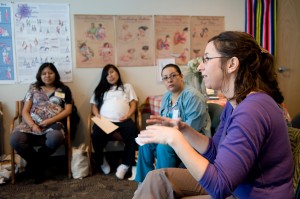“From the moment of conception to the initial, tentative step into a kindergarten classroom, early childhood development takes place at a rate that exceeds any other stage of life” (National Research Council & Institute of Medicine). It’s no secret that women who receive prenatal care in their first trimester of pregnancy (up to 12 weeks) tend to have healthier babies. But with just 78% receiving adequate* care across the state and Hennepin county, that leaves over one in five expectant mothers un- or under-served (Minnesota Department of Health).
So who are the mothers who fall in this category? Statistically, young, low-income mothers within certain racial and ethnic groups and with fewer years of formal education are far less likely to receive prenatal care. Taking one case study for example, in 1988, Minnesota had the fifth worst record for early prenatal care in the country. Delving deeper, researchers found that only 16% of Hmong women sought prenatal care in the first trimester and nearly a third delayed care until the final three months of pregnancy (Minnesota Medicine).
 Though today, the rate of Hmong women accessing prenatal care has improved, we continue to see African American, Native American, and Latino populations remain in need of greater prenatal attention. Both Latino and Native American populations in Minnesota, for instance, have a teen birthrate that is more than three times higher than that of white teens.
Though today, the rate of Hmong women accessing prenatal care has improved, we continue to see African American, Native American, and Latino populations remain in need of greater prenatal attention. Both Latino and Native American populations in Minnesota, for instance, have a teen birthrate that is more than three times higher than that of white teens.
It is no secret that under-serving these families now lead to even greater disparities down the road. Healthy pregnancies and full-term births are the first step in ensuring infants and toddlers are reaching developmental milestones from the moment they are born. Recognizing that prenatal care is critical to preparing children for a successful future, Way to Grow incorporates prenatal education into our holistic home visiting model. Last year, we served 157 expectant parents in Minneapolis by monitoring and encouraging attending prenatal appointments, providing nutritional education, and offering support groups for both teen and new parents. Through these methods, we are able to reduce the risk of complications during pregnancy and ensure each infant’s health and development is on track.
 “Way to Grow recognizes that the earlier support is provided to families, the more successful the intervention,” Dr. Ed Ehlinger, Health Commissioner of the Minnesota Department of Health says. “Way to Grow was built on proven interventions that have promoted and maintained health, making them a wonderful resource for families and communities in creating opportunities and promoting healthy children in Minneapolis.”
“Way to Grow recognizes that the earlier support is provided to families, the more successful the intervention,” Dr. Ed Ehlinger, Health Commissioner of the Minnesota Department of Health says. “Way to Grow was built on proven interventions that have promoted and maintained health, making them a wonderful resource for families and communities in creating opportunities and promoting healthy children in Minneapolis.”
*Defined as receiving nine or more prenatal visits during pregnancy and being seen in the first trimester.




